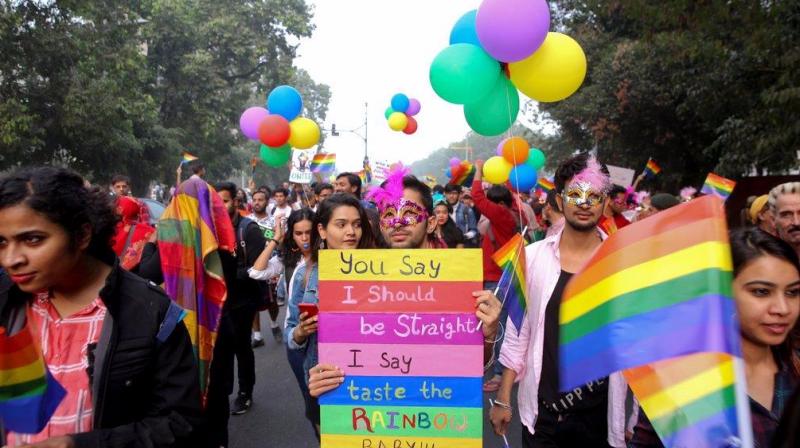- About
- Topics
- Picks
- Audio
- Story
- In-Depth
- Opinion
- News
- Donate
-
Signup for our newsletterOur Editors' Best Picks.Send
Read, Debate: Engage.
| May 15, 2019 | |
|---|---|
| topic: | LGBT Rights |
| tags: | #India, #Humsafar Trust (HST), #LGBTQ, #HIV |
| located: | India |
| by: | Shuriah Niazi |
The Humsafar Trust (HST) was set up in April 1994 by well-known writer Ashok Row Kavi, to reach out to LGBTQ communities in Mumbai and nearby areas. It became the first openly gay community-based organisation to be allocated space in a municipal building in Mumbai.
The Trust encouraged gay men and lesbian women to take part in its workshops at its drop-in centre. The centre saw a range of workshops and meetings on issues of HIV/AIDS and human rights of LGBTQ and soon the trust started working assertively on the health and human rights of the community.
India's first Human Immunodeficiency Virus (HIV) treatment centre and clinic for the LGBTQ community was inaugurated recently in Mumbai. The Humsafar Trust has set up the clinic almost a quarter-century after it set up its drop-in centre in Mumbai.
“The clinic will provide free counselling and Anti-Retroviral Therapy (ART) used to treat the infection or delay the progression process,” said Ashok Row Kavi. “The centre is opened for all and serves as a one-stop centre for counselling, detection and treatment of HIV.”
According to Dr Srikala Acharya of Mumbai District AIDS Control Society, the number of HIV positive patients had declined significantly over the past 20 years because of the involvement of community-based groups.
She said, “Out of 4,000 males who have sex with men are monitored regularly by us. According to recent figures, only 253 tested positive for AIDS.”
Homosexual intercourse was declared "unnatural" which made it a criminal offence under Chapter 16, Section 377 of the Indian Penal Code, 1860. This is when India was still a colony under the British Empire. In 1947, India gained independence but homosexuality remained an offence.
In September 2018, history was created in India when the Supreme Court struck down Section 377 and accorded dignity to the LGBTQ community that has long been discriminated against. The petition on the Supreme Court was filed by the Humsafar Trust founder chairperson Ashok Row Kavi, chief executive officer Suhail Abbasi and its staff members Yashwinder Singh and Gautam Yadav.
The then Chief Justice of the apex court Dipak Mishra observed that criminalising intercourse is irrational, arbitrary and manifestly unconstitutional.
The court ruled that any discrimination on the basis of sexual orientation is a violation of the Indian Constitution.
“History owes an apology to these people and their families. Homosexuality is part of human sexuality. They have the right to dignity and free of discrimination. Consensual sexual acts of adults are allowed for the LGBT community,” observed Justice Indu Malhotra, another judge of the 3-judge bench that delivered the verdict.
Following the apex court order, acceptance of LGBTQ rights in India is growing and the government and the people are beginning to appreciate the rightful place of the members of this community in the society. Activists have been running effective campaigns to change the people’s attitude and advocating for the formation of anti-discrimination laws.
“The judgment opened the doors for different opportunities and closed the door of a dark chapter of Indian history”, said a 23-year-old lesbian college student in Bhopal in the central state of Madhya Pradesh who spoke on condition of anonymity.
She said further, “although the judgment is considered to be a remarkable victory, the civil rights movement for the LGBTQ community needs to continue in a more responsible way. It is important to create safe spaces for the LGBTQ community and work towards strengthening the community. The attitude of the people and the society towards members of the community is not going to change immediately.”
“The LGBT community had faced extortion, blackmail and violence citing fear of Section 377 of the Indian Penal Code that criminalized consensual sex between two adults in private spaces. Now that has ended to a large extent”, said a middle-aged gay in Lucknow, capital of India’s most populous state of Uttar Pradesh. “But the LGBT community still faces various issues like acceptance in the family and society, dealing with relationships, dealing with legal issues of gay men and handling crisis situations with families. However, things are changing for the better and people’s feelings towards LGBT people are changing.”
Since 2014, transgender people in India have been permitted to change their gender without sex reassignment surgery, and have a legal right to register themselves under a third gender. Besides some states protect the country’s traditional third gender population through housing programmes, welfare benefits, pension schemes, free surgeries in government hospitals and other programmes designed to assist them. There are about 4.8 million transgender people in India.
In the coming years, the major issues for LGBT rights in India will be doing away with maltreatment based on sexual orientation; legal security from hate crimes and hate propaganda; equal rights including marriage and adoption and to work and educate others on homophobia and heterosexism.
India’s National AIDS Control Organisation (NACO) and Mumbai District AIDS Control Society (MDACS) are supporting the Humsafar Trust (HST) to provide health services to members of LGBTQ community through public healthcare delivery systems and its in-house clinics.
HST founder Ashok Row Kavi said, “HST has nurtured support groups for persons living with HIV. We also provide legal support, crisis management, mental health and nutrition counselling to the communities.”
2019 marks the 25th year of the Humsafar Trust serving the spectrum of LGBTQ rights in India. In 2019, the trust, activists and other aware and compassionate citizens will be presenting, celebrating and taking forward the work that started in 1994.
By copying the embed code below, you agree to adhere to our republishing guidelines.
